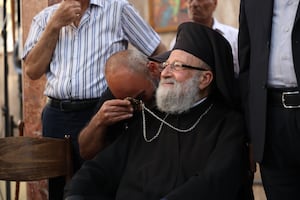Until a suicide bombing killed 20 people at a church in a low-income area of Damascus on Sunday, Christians had been spared the mass violence that has afflicted other minorities under the new Syrian state that replaced the Assad regime last year.
The government, led by former Hayat Tahrir Al Sham (HTS) militants who split from Al Qaeda a decade ago, has been touting its good ties with the clergy and Christian community at large in recent months. The relationship has been part of its quest for Western backing of Syria's economic recovery efforts after 13 years of civil war.
Foreign powers have called for an inclusive Syrian state as a condition of support for the new regime. Despite the killing by pro-government militias of more than 1,500 civilians from the country's Alawite and Druze communities during sectarian violence in March and April, efforts by Damascus to secure Western backing have gathered pace.
Syria has deepened ties with Europe and reached normalisation with the US, a process ushered in by a meeting on May 14 between Syria's leader Ahmad Al Shara and President Donald Trump in Riyadh. Washington also decided to lift sanctions on Syria.
US officials, who have previously condemned the killing of Syria's minorities, have said rapprochement with the post-Assad order is necessary to stabilise the nation and prevent wider violence. Syria, under Mr Al Shara, constitutes a bulwark against Iran and could become a signatory to the Abraham Accords, they said.
But with the bombing of the Mar Elias Church in the capital's Dweila district on Sunday, the goal of the perpetrators was to “create headlines” in the US and elsewhere, spreading the notion that Christians have become a target under the Islamist government, said prominent Syrian political commentator Ayman Abdel Nour. “The objective is to weaken the state,” he told The National.
Syrian state media reported that the church suicide bomber was affiliated with ISIS, whose sleeper cells have reportedly been taking advantage of the removal of the dictator Bashar Al Assad by seizing weapons left unsupervised in the wake of his fall. No one has declared responsibility for the attack, but if ISIS was the culprit it would indicate an expansion of the terror group in Syria.
Mr Abdel Nour said the attack on the church, situated just outside the walls of Old Damascus, appears intended to inflict the maximum loss of Christian life. It occurred at Sunday evening mass, not in the morning, when the church has fewer worshippers, because Sunday is a work day in Syria.
Even before Syria's civil war began in 2011, the Assad regime, dominated by the Alawite sect, portrayed itself as a bulwark against Sunni extremist groups such as Al Qaeda. The rise of ISIS helped it drive home that message, particularly among Syria’s minorities.
'Dark ideology'
Christians, who make up 5 per cent of the Syrian population, have been important politically for the new Syrian government, to the point that they were the focus of an invitation for two Republican members of the US House of Representatives to visit the country.
The two politicians, who are ideologically close to Mr Trump, travelled to Syria on Easter weekend and met with the top figures in the clergy. The trip helped present a positive image of the new government and its attitude towards Christians and laid the groundwork for the ensuing rapprochement with the US.
Observers said that Mr Al Shara needs to do more to drive a wedge between his government and religious extremists. Human rights lawyer Firas Abdin said Mr Al Shara should visit the site of the explosion to show solidarity and not just send subordinates.
He said the bombing was punishment for Christians for their support of the new HTS-led state. It was also an attempt “to convince the Christians of Syria that the current government is extremist and change their view of the new epoch”.
Political writer Wael Sawah said an official condemnation issued after the church attack was not enough. “The Al Shara government must pursue those responsible and whoever stands behind them, and submit them to a public trial,” he said.
Mr Sawah, a former political prisoner under the Assad regime, has been critical of the new government and its religious doctrine. Syria's leaders must condemn “the dark ideology” behind the church bombing, he said.
A senior regional security source told The National that Sunday's attack “could be the gateway to a renewed era of terror”.
“It could be a calculated attempt to drag the region into far deeper turmoil, when all eyes are on the Israel and Iran war.”



